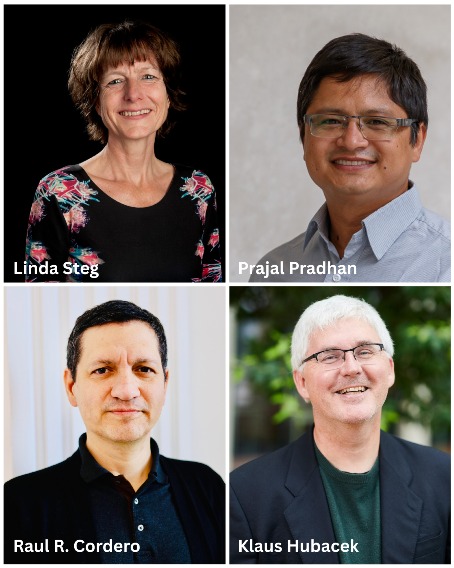Rudolf Agricola School fellows join IPCC Seventh Assessment Report

Four researchers from the University of Groningen have been selected as authors for the Seventh Assessment Report of the Intergovernmental Panel on Climate Change (IPCC) — the world’s foremost body for assessing climate science. Raul R. Cordero and Prajal Pradhan have been appointed as Coordinating Lead Authors, Klaus Hubacek and Linda Steg will serve as Lead Authors. All four experts are fellows of the Rudolf Agricola School for Sustainable Development (RAS).
Raul R. Cordero will be contributing to the Working Group I, dealing with the physical science basis of climate change, while Prajal Pradhan, Klaus Hubacek and Linda Steg will contribute to Working Group III, dealing with the mitigation of climate change.
The Intergovernmental Panel on Climate Change (IPCC) is the UN body for assessing the science related to climate change. For the Seventh Assessment Report (AR7), the IPCC has brought together 664 experts from 111 countries to serve as Coordinating Lead Authors, Lead Authors, and Review Editors. Their selection, made by the IPCC Bureau, followed nominations by governments and observer organisations from a global pool of 3,771 nominees.
In its announcement, the IPCC’s Chair Jim Skea noted: “The appointment of the author teams means that work on the Seventh Assessment Report on the state of climate science can now begin. The author teams, drawn from several thousand excellent nominations, ensure outstanding expertise across a range of disciplines. We are proud that the new author teams reflect increased diversity, in terms of both gender balance and greater representation from developing countries and economies in transition”.
The appointed authors will now begin their work on assessing relevant literature and preparing drafts of their respective reports on the basis of the outlines of the Working Group contributions to the AR7, agreed upon by the Panel at its 62nd session in Hangzhou, China, in February 2025. The First Lead Author meeting is scheduled for early December.
The three IPCC Working Group reports are expected to start appearing in mid-2028, while the Synthesis Report that will conclude the entire cycle will be approved by late 2029, completing the seventh assessment cycle.
The IPCC in its own words
The IPCC was established by the United Nations Environment Programme (UNEP) and the World Meteorological Organization (WMO) in 1988 to provide political leaders with periodic scientific assessments concerning climate change, its implications and risks, as well as to put forward adaptation and mitigation strategies. In the same year the UN General Assembly endorsed the action by the WMO and UNEP in jointly establishing the IPCC. It has 195 member states.
Thousands of people from all over the world contribute to the work of the IPCC. For the assessment reports, scientists and experts volunteer their time as IPCC authors to assess the thousands of scientific papers published each year to provide a comprehensive summary of what is known about the drivers of climate change, its impacts and future risks, and how adaptation and mitigation can reduce those risks.
The IPCC has three working groups: Working Group I, dealing with the physical science basis of climate change; Working Group II, dealing with impacts, adaptation and vulnerability; and Working Group III, dealing with the mitigation of climate change. It also has a Task Force on National Greenhouse Gas Inventories that develops methodologies for measuring emissions and removals.
IPCC assessments provide governments, at all levels, with scientific information that they can use to develop climate policies. IPCC assessments are a key input into the international negotiations to tackle climate change. IPCC reports are drafted and reviewed in several stages, thus guaranteeing objectivity and transparency.
You can learn more about IPCC on their website.
More news
-
15 September 2025
Successful visit to the UG by Rector of Institut Teknologi Bandung

